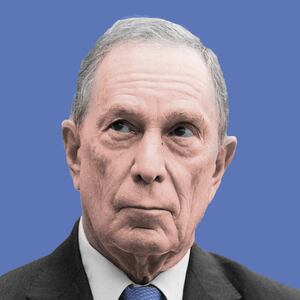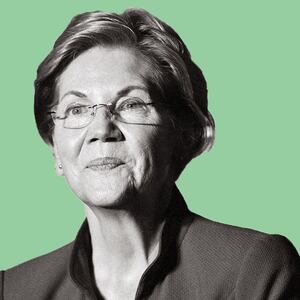At a closed-door fundraiser late last year, Sen. Amy Klobuchar (D-MN) was notably fixated on, and visibly irritated by, one of the fellow Democrats vying for the presidential nomination. Former New York City Mayor Michael Bloomberg had just entered the race. But he had already managed to get under his competitor’s skin.
At the event in Northern Virginia, Klobuchar talked at length about Bloomberg’s massive TV ad blitz and the gobs of cash he was planning to throw into the 2020 primary, according to an account from a source in the room who attended.
“She talked about how she was on a Sunday show for 10 minutes and saw five or six Bloomberg ads while she was in the green room,” the Democratic attendee, who donated money to Klobuchar’s campaign for entrance into the event, told The Daily Beast. “She’s very worried about the amount of money he’s spending.”
“It was 60 percent of what she talked about,” the source estimated.
The private moment, which occurred before the senator had opened her fundraisers to the press, provided an early glimpse into what has become a growing sense of internal anxiety from some Democratic campaigns about the billionaire candidate’s potential to shake up the primary that he entered so late.
Klobuchar has since made those concerns public, criticizing Bloomberg for trying to buy the nomination. And with just two weeks before voting starts, her concerns that the former mayor may just pull it off are beginning to be echoed elsewhere. Bloomberg still lags in the polls. But national averages now have him tied for fourth place at 7.7 percent with former South Bend Mayor Pete Buttigieg, who has spent a year pounding the campaign trail.
Suddenly, talk of Bloomberg becoming the nominee has gone from being dismissed as the stuff of political fantasy to being entertained as a true reality among campaigns.
“I think there is a 10-15 percent chance that Bloomberg pulls it off,” said one top Democratic fundraiser, who has worked closely with the presidential campaigns.
“At this juncture, when you can spend that amount of money on TV across the country, you do take it seriously,” said a top official for a competing campaign. “And he's gotten a bump in the polls, so it is nothing to scoff at.”
The official, who would only talk on condition of anonymity, still expressed pessimism that Bloomberg could pull it off, arguing that “the argument for a nice billionaire” had not “made traction” as much as it needed to, considering the war chest devoted to it. And, indeed, the Bloomberg path still remains predicated on a series of unlikely events: that no actual candidate emerges from the first four primary states and that former Vice President Joe Biden ends up dramatically weakened by a poor showing in those contests. Should that be the case—the theory goes—Bloomberg’s ad spending in other states would propel him in the polls, turn him into the moderate alternative that Biden was supposed to be, and help him eke it out in a contested convention.
In his short time in the race, Bloomberg’s campaign has ramped up its infrastructure and ground game. He has scored several endorsements from fellow mayors and members of congress, held major events for a new campaign—including a stop that attracted 700 people in Tulsa, Oklahoma and another that brought in 500 in Akron, Ohio—and deployed 700 people across 33 states, including 300 in his New York City headquarters. Bloomberg’s team is currently airing ads in 27 states, including all Super Tuesday contests.
Eyeing these movements, some rivals have begun more forcefully calling him out by name, while others have worked in private, conducting internal polling on his possible delegate hauls and pushing opposition research to blunt his traction.
Another source from a rival campaign said that Bloomberg doesn’t factor into their official strategy, but conceded that staffers are following his moves in certain states, including California, which represents a potentially huge delegate haul for hizzoner.
“We see that Bloomberg’s playing very big in California,” the senior campaign aide said. “We are very quick in adapting. We can switch messages very fast. And we have the resources to go the long game.”
A third opponent’s team is keeping close enough tabs on Bloomberg that aides are dedicating internal polling resources to game out potential delegate scenarios on Super Tuesday, where 15 states are set to vote in early March. The Daily Beast recently reported that, according to the Democratic rival’s internal data—a summary of which was independently corroborated by multiple independent analysts—Bloomberg was not on track to receive a single delegate on that day. The Democratic National Committee’s rules stipulate that a candidate must win 15 percent of the vote statewide or 15 percent by any congressional district in order to collect any delegates.
Privately, some establishment Democrats are cheering the Bloomberg boomlet, having talked themselves into the prospect of a Democratic presidential candidate with centrist appeal and absurdly deep pockets being the best nominee to take on Trump.
“Everyone I talk to is convinced he would win,” said one top party donor.
Bloomberg has helped his standing among party members by pledging to support and spend heavily on whoever is the nominee and by notably keeping the focus of his ad campaign on attacking Trump and not fellow candidates. One Democratic strategist who recently spoke with Bloomberg’s team said that they broached the idea of going after Biden but quickly dismissed it out of hand.
“They’re not prepared to take Joe down,” said the strategist. “Their view is we go through the first four contests and it is a complete muzzle.”
For the progressive wing of the party, however, a Bloomberg candidacy represents a moral conundrum and political peril—with fear rampant that he would not excite the very constituencies that the party needs to win; mainly young voters and voters of color.
As such, they’ve engaged him more directly.
Sen. Elizabeth Warren (D-MA), who in late November chose Bloomberg as the first candidate to criticize after months of remaining rhetorically positive about her rivals, has turned up her fire in recent days. On Wednesday, the Massachusetts senator called for a close vetting of the billionaire Democrat over his news corporation’s guidance to reporters.
“Bloomberg News banned its reporters from investigating Democratic candidates as Mike Bloomberg runs for president. This ban puts reporters in an impossible situation and undermines a free press. Bloomberg should lift the ban and divest from Bloomberg News,” Warren tweeted on Wednesday.
She then threw herself into the equation: “I’ve taken more than a thousand unfiltered questions from the press and from voters since I got in the race. I welcome tough questions and scrutiny because the free press is a cornerstone of our democracy—and every presidential candidate should be closely vetted.”
Bloomberg’s campaign manager Kevin Sheekey responded in an interview with Fox and Friends by calling Warren “nervous.”
“I think she’s nervous that Mike Bloomberg is catching up on her. Mike is now in fourth place in this race and will probably pass her and be in third place soon,” Sheekey said.
Asked about the idea that other candidates are starting to worry about their campaign, a Bloomberg official did what the campaign has been doing since the onset: turned the attention back towards Trump.
“We are confident that Mike is the best candidate to beat Donald Trump and that’s why we’re building the most robust national campaign to take him on,” Galia Slayen, a campaign spokeswoman, told The Daily Beast.
UPDATE: A Klobuchar campaign official disputes the amount of time the candidate spent talking about Bloomberg, telling The Daily Beast 60 percent is not accurate.









